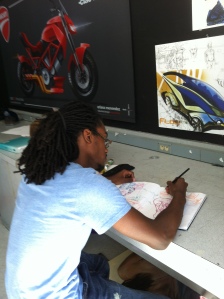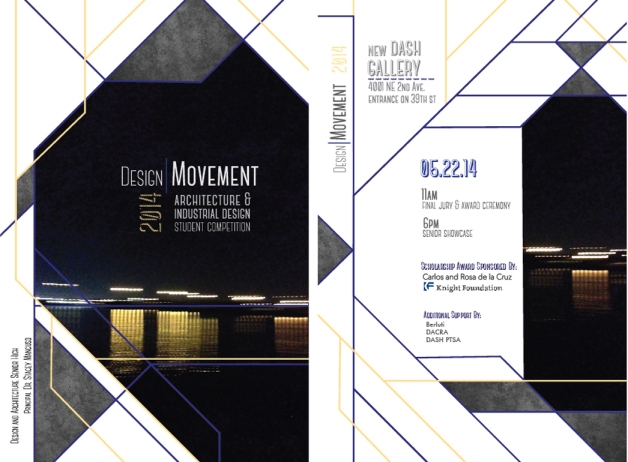 Phillip Burrows,
Phillip Burrows,
Industrial Design (ID)
DASH Dispatch: In terms of workload and time management, what are the main differences between what you knew about your strand before you started versus now?
Phillip Burrows: When I was first introduced to the Industrial Design strand the seniors told me (and everyone else in the presentation): “Hey, we get NO sleep.” Initially, I was skeptical because everyone looked happy when I saw them around school, and no one had bags under their eyes so, I just thought they were trying to scare us (the freshmen) away. Well, they weren’t just trying to scare us away. 10th grade year I underestimated the workload and ended up pulling all-nighters on simple projects. But as I advanced through the years as an ID student, my understanding of the design process solidified and things stopped seeming so vague and incomprehensible. I learned what concept pages, layouts, and light lines were. Now I know that doing ID work and finishing a project take careful pacing. You can’t try to rush through a project. You’ll either KO, put out crappy work, or both.
DD: What strategies or changes to your routine have helped you manage your workload?
PB: I plan, pace myself, and prepare myself for ID class. I like to take an envelope or scrap paper that is just going to get thrown away and write down a schedule of my days for the week in 1-2 hour intervals titled: What I Have To Do To Get A Decent Amount of Sleep. This includes academic work. I’m also conscious of my limits. I know I can’t do 8 GOOD concept pages or renderings in one weekend when I also have an essay to write for English and 2 packets to do for Pre-Cal on top of that. So I plan to do pages periodically throughout the week, 1 per night until the weekend when I have more time to do about 2 per day. Also, work is easier when you’re actually used to doing the work. So, if Ms. K tells the class we’re going to start rendering soon, I’ll set some time aside to go on the internet at home and get familiar with different rendering techniques. Markers are expensive but we don’t use them much. I try to stop by Utrecht and get one marker per week for several weeks so I can have a decent set of 2-3 color ranges.
DD: How do you get your work done outside of DASH when you don’t have access to the resources at school (i.e. software, sewing machines, etc.)?
PB: I found some friends who were in my area and asked them if they could help me out with what I needed. Other than that I stocked up on school exclusive supplies like French Curves, T-Squares, and Triangles sophomore year and they’ve lasted me till my senior year. Also, I stocked up on paper for projects that came early in the year in case I ran out later. Having a backup supply means I’m always set even if I forget or underestimate during a tough week.
DD: In what ways have your classmates, family, or friends become a support system?
PB: The ID community is like a family. We’re a very tight-knit strand. Everyone’s usually sociable and willing to talk to you and clear up any confusion you have about a project or a particular component of a project. Personally, they have been there to call, message on Facebook, or talk to during lunch. Even on Skype at times, if I need a visual idea of what Ms. K may want. I also talked to the juniors and seniors (moreso the seniors) when I was a freshman and sophomore, because they would tend to have a solid grasp of what Ms. K wants. They also knew techniques that she wouldn’t have taught us yet and that’d give me a bit of an edge in class.
DD: What do you do to balance school work with time for rest, social activities, a job, etc.?
PB: You have to be organized. I’ve learned how long it takes me to do a certain amount of work so that I can work around certain social schedules and get enough sleep so my brain doesn’t totally deteriorate. If a party starts at 7 or I’m going to the movies at 5 on Saturday, I’ll wake up a bit earlier than usual (which also means I go to sleep earlier on Friday) and get right to work. I’ll pull out that envelope I wrote my weekend workload on and get that done in the morning. I have a weekend alarm clock schedule that screams into my ear from 8 AM – 9 AM and again from 10 AM – 11 AM, until I’m definitely up.




